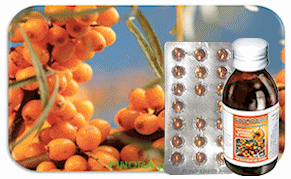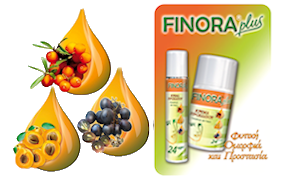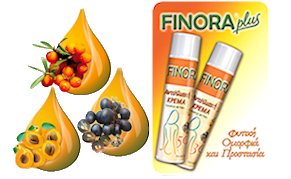Characterization |
Abbrev. name for Vitamins |
Recommended daily dosage for adults |
Actions |
Contained in the following |
Fat-soluble Vitamins |
Retinol |
A |
0.8-1mg |
Improves vision and growth of cells, renews the skin |
Oil of Apricot kernel, liver, milk fat, fish and as Provitamin in many plants |
Tocoferol Acetate |
E |
10-15mg |
Renewing cells and has anti-inflammatory action. It strengthens the immune system and acts as a scavenger of free radicals |
Oil of Apricot kernel, vegetable oils, broadleaf vegetables |
Cholecarciterol |
D3 |
5mcg |
Against rachitis. Better absorption of calcium and magnesium |
Oil of Apricot kernel, Cod liver oil, Fish |
Water-soluble Vitamins |
Ascorbic acid |
C |
100mg |
It protects from infections, acts as a scavenger of free radicals, strengthens the connective tissue |
Oil of Apricot kernel, lemons, oranges |
Thiamine |
B1 |
1.5mg |
Strengthening of nerves, inhibiting atony, stiffness of body parts, muscle atrophy and cardiac failure |
Oil of Apricot kernel, grains, brewer's yeast |
Riboflavin |
B2 |
1.3-1.7mg |
Improves fats, proteins and carbohydrates, and is good for skin and nails |
Oil of Apricot kernel, pork meat, green vegetables, beans, seeds |
Niacin |
B3 (PP) |
20mg |
It helps curb dermatitis, diarrhea, nausea and vomiting |
Oil of Apricot kernel, products of animal origin, brewer's yeast, royal jelly, eggs, wheat germ, dairy products, green vegetables, beans, seeds |
Pyridoxine |
B6 |
1.5mg |
Contributes to the formation of amino acids, the fats and carbohydrates metabolism processes |
Oil of Apricot kernel, broccoli, flaxseed, rice, pears |
Cyanocobalamin |
B12 |
1.4mcg |
Against malignant anemia disease and other malignant formations
|
Oil of Apricot kernel, liver, red meats, turkey, fish and shellfish |
Amygdaline or Laetrile |
B17 |
3mg |
Destroys the coating protein in cancer cells |
Oil of Apricot kernel, peach kernel, apple seeds, bitter almonds, beans, nuts and barley |
Vitamin B12 (Cyanocobalamin) is rarely found in the plant kingdom. It helps in vast problems such as Pernicious anemia and other malignant formations, in diseases such as Pouchitis colon and other diseases of the small intestine, while restoring the absorptive capacity. Amygdaline or Laetrile or B17.
The physical form of Amygdaline (Laetrile)
Mode of action of B17
When the B17 comes into contact with cancer cells, a reaction known as SELECTIVE TOXICITY appears, where the B17components attack the cancer cells only in the areas where they are grown.
There are two enzymes that are directly related to the action of B17 in the body. The first enzyme is named B Glycosidase and occurs in increased amounts (up to a hundred times) around the cancer cells.
Its role in relation to B17 is to disperse into two parts glucose, 1 part of hydrogen cyanide and one part of Benzaldehyde, thereby increasing to 100 times the toxicity of the components.
The second related enzyme called Rhodanase and which is found in significant quantities throughout the body, apart from the areas where cancer cells are grown.
Its role in relation with B17 is to degrade and thus neutralize the cyanide throughout the body and outside the areas where there is cancer.
Lack of B17 is reported to have reduced significantly the immunity towards tumors, while no side effects have been reported (such as hypervitaminosis) from extensive overdoses.
The pancreatic enzymes Trypsin and Chymotrypsin contribute to the effectiveness of selective toxicity as they destroy the coating of the protein in cancer cells, thus making them unprotected against the immune system or anti-cancer agents, such as vitamin B17, for this reason the use of suitable digestive enzyme supplements is recommended, with a simultaneous decrease of meat consumption.
If you are a cancer patient you should consult your doctor. Vitamin B17 does not replace chemotherapy.
Aerial spraying and Oil of Apricot Kernel
If you believe that aerial spraying (Chemtrails) contain harmful chemicals, you can protect and enhance your body with Oil of Apricot Kernel and Oil of Hippophaes
Fatty Acids
Fatty acids |
Percentage |
Average |
Saturated fatty acids |
|
|
|
Palmitic acid |
C16:0 |
3.6 |
4.28 |
Stearic acid |
C18:0 |
Trace-2.0 |
1.12 |
Monounsaturated fatty acids |
|
|
|
Palmitoleic acid (n-7) |
C16:1 |
Trace-1.4 |
0.70 |
Oleic acid (omega-9) |
C18:1 |
55.0-70 |
69.62 |
Eicosenoic acid |
C20:1 |
Trace-1.0 |
0.18 |
Polyunsaturated fatty acids |
|
|
|
Linoleic Acid (omega 6) |
Trace-1.0 |
20.0-35.0 |
23.34 |
Linolenic Acid (omega 3) |
C18:3 |
Trace-1.0 |
0.22 |
Omega 6 Fatty Acids (Linolenic Acid)
Linolenic acid (CLA conjugated omega-3-omega-6), after experiments on mice and rabbits, prevented the appearance of cancerous tumors and contributed to the reduction of atherosclerosis. Eliminates pre-cancerous cells, stimulates the immune system, helps in preventing heart disease, and controls the levels of triglycerides and bad cholesterol and fighting diabetes.
Omega 9 Fatty Acids (Oleic Acid)
The oleic acid is found in abundance in the apricot fruit oil. It has a beneficial effect on the cardiovascular system, reduces the risk of oxidation of the rectum, colon, breast, prostate, pancreatic and endometrial.
Omega-N fatty acids
The lack of polyunsaturated fatty acids in the diet is directly related to a weakened immune system, poor functioning of the heart and nervous system. Oleic acid is omega-3 fatty acid which enhances the functionality of the cardiovascular system, reducing the risks of oxidation, especially of the colon, prostate and uterus. Precious ingredients contained in the Oil of Apricot Kernel act effectively against free radicals, and therefore premature aging. They also help to treat numerous problems which the human body encounters, such as improvement and delaying in the appearance of wrinkles, even in the elderly, injuries caused by the detrimental effect of radiation on the skin, the mucosa of the eyes, dryness in eyes and improvement of vision in general, skincare, acne, dry skin and other irritations.
Physicochemical properties of Oil of Apricot Kernel
>
Appearance |
Liquid |
Colour |
Light brown |
Smell |
Characteristic |
Iodine number |
101.70mg KOH/1g (* Reception allowed as the iodine content is less than150mg) |
Saponification number |
195.1mg KOH/1g |
Acid value |
32mg KOH /1g |
Refractive index |
1.4666 |
PH value |
7.80 |
Specific density |
20c 0.91315g/cm³ |
Heavy metals |
Not Contained |
Residues of plant protection |
Not Contained |
Nutritional Information
|
Oil of Apricot Kernel 10mg |
Units |
RDI * The values correspond to the daily needs of an adult |
Energy (calories) |
76.56kcal |
g |
3.83 |
Proteins |
0 |
g |
0.0 |
Carbohydrates of which |
0 |
g |
0.0 |
Sugars |
0 |
g |
0.0 |
Total fat of which |
8.51g |
g |
12.14 |
Saturated fats |
0.66g |
g |
4.95 |
Fiber |
0g |
g |
0.0 |
Sodium |
0g |
g |
0.0 |
Vitamin A Retinol |
871.2IU |
IU |
17.42 |
Vitamin E Tocoferol |
4.44mg |
mg |
29.6 |
Vitamin C Ascorbic acid |
0.092mg |
mg |
0.13 |
Vitamin D3 Cholecarciterol |
22255IU |
IU |
5563 |
Vitamin B1 Thiamin |
12.5ìg |
ìg |
207 |
Vitamin B2 Riboflavin |
0.0066mg |
mg |
0.26 |
Vitamin B3 Niacin |
0.053mg |
mg |
0.26 |
Vitamin B6 Pyridoxine |
0.0066mg |
mg |
0.46 |
Vitamin B12 Cobalamin |
31ìg |
ìg |
514 |
Vitamin Amygdalin |
35ìg |
ìg |
** |
Omega 3 fatty acids (alpha-linoleic acid) |
27.75mg |
mg |
** |
Omega-6 fatty acids (alpha-Linolenic acid) |
4.22g |
g |
** |
Omega-7 fatty acids (Palmitoleic acid) |
0.06g |
g |
** |
Omega-9 fatty acids (Elaic acid) |
5.7g |
g |
** |
* RDI Recommended daily intake based on a 2000 calories diet ** Recommended daily intake not fixed |
It even contributes to the good functioning of the cardiovascular system, problems with the liver and pancreas, in treatment of muscle atrophy, in cases of rachitis, breathing problems, such as pneumonia and asthma, treating of buzzing ears, strengthening bones, inflammation of the bile, bladder and other infections of the genital organs, stomach and duodenal ulcer, vomiting, diarrhea and nausea. The effectiveness of the Oil of Apricot Kernel is contributed by its high liquidity, thus allowing it to be absorbed immediately, by carrying valuable components in the human body. It is suitable for internal and external use. In harmony with nature, the Oil of Apricot Kernel provides precious ingredients with beneficial effects for the human body.
Do not wait to get sick.
Recommended for daily consumption dosage: 2-3 teaspoons a day (10-15ml)
External use: apply twice a day.
Buzzing ears: three drops three times a day.
|
 |
Oil of Hippophaes (Sea Backthorn)
in bottles and capsules. |
IMPORTANT NOTICE: The packaging in capsules has significantly lower strength and for those who have difficulty with the flavor of oil or people who travel by plane, as in this case the carriage of oil is not allowed in luggage |
|
 |
 |
| |
Hydrating facial cream,
exclusively from natural ingredients |
Sunscreen cream from herbs and
fruits 50ml
SPF 30 and SPF 50 protection |
|